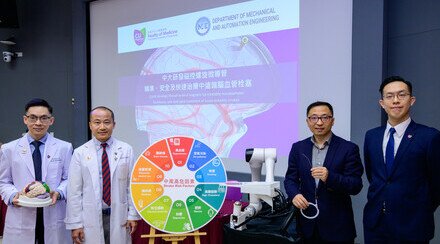Hong Kong’s First Scientist Awarded Runner-up for the 2014 Eppendorf and Science Prize for Neurobiology CUHK Medical Student Dedicated to Unraveling Mystery of Neuronal Circuits
With research on synaptic connections in the neocortex, Dr. Owen Ko, a year 5 medical student of the Chinese University of Hong Kong (CUHK) is selected as one of the runners-up in this year’s Eppendorf & Science Prize for Neurobiology. Being the Hong Kong’s first scientist to snatch this honour, Owen’s winning entry concluding his research achievement has been published in the prestigious scientific journal Science. Owen will be presented the award in Washington, D.C. on 16 November 2014.
Despite the rapid advancement of modern technology, knowledge on how the brain functions is still very limited. Owen’s research provides experimental ground for scientists to comprehend further. “To understand how a computer functions, you have to know the functionality of each component in it and how they are connected at the first step. This applies to our brain as well. We have to know the functionality of each neuron in our brain and their connectivity. Only with this information, we can start to understand how the brain normally function, and tell which part of the component goes wrong when there is malfunction, so as to find ways to fix it,” said Owen.
Owen was admitted to the Bachelor of Medicine and Bachelor of Surgery programme (MBChB) of CUHK Faculty of Medicine in 2005. After completing the second year of studies, he pursued a one-year intercalated Bachelor of Medical Sciences in 2007. In 2008, he was recommended to a three-year PhD programme in neuroscience under the guidance of Professor Thomas Mrsic-Flogel, an internationally renowned neuroscientist, at University College London (UCL), and a year of post-doctoral research in the UK.
During his study in the UK, Owen made a number of research breakthroughs including uncovering how connectivity in the cortex is organized with respects to the functionality of neurons and that this specific connectivity emerges after the onset of visual experience, and that visual experience is partially required for the complete maturation of functionally specific connectivity in the primary visual cortex.
Since 2011, research articles with Owen being the lead author had been published in several prestigious scientific journals, including Nature, and Nature Neuroscience and The Journal of Neuroscience. At the same time, Owen has also been working closely with Professor Wing-Ho Yung, Assistant Dean (Student Affairs) of the Faculty of Medicine and Professor of the School of Biomedical Sciences of CUHK, and co-authored a number of articles in international journals such as Neuron and Cerebral Cortex.
After receiving his PhD, Owen was back to Hong Kong in 2012 to continue the MBChB programme in CUHK and simultaneously conduct research work. He is supported and funded by the Lui Che Woo Institute of Innovative Medicine and the Chow Yuk Ho Technology Center for Innovative Medicine, and working with a team of professors and postgraduates from both the Faculty of Medicine and Faculty of Engineering in CUHK on new research projects on the neuronal networks for sensory perception and motor control. Owen is aspired to continue research in neuroscience after his graduation and is determined to contribute to the industry at large by laying the foundation for further development of effective medical treatment to those suffering from neuronal disease such as Parkinson’s disease and dementia.
CUHK Global Physician-Leadership Stream to Nurture Physicians Leaders
"We are all very happy for the prize given to Owen, it highlights the importance of, and how students can benefit from, early research training,” Professor Justin Wu, Associate Dean (Development) of the Faculty of Medicine and GPS Programme Director highlighted. “Seeing the significance of scientific research to the sustainable development of medicine and therapeutics, we are determined to provide full support to students who are interested in medical research.”
Since 2013, the Faculty of Medicine has been running the Global Physician-Leadership Stream (GPS) with a personal mentorship scheme where students will be matched with renowned professors in their different research areas or clinical professions. This arrangement enables students to learn more about their perspective professions in earlier university life. Outstanding students will also have chance to further their studies at top overseas institutions including the University of Oxford, the University of Cambridge and the Yale University.
Valuing the incubation of global perspectives and leadership competencies among students, CUHK aims to nurture a new breed of physician leaders by providing them with diverse paths of graduate studies and leadership training courses in addition to medical training. Graduates are expected to play pivotal leadership roles in the medical community to meet the future challenges of the healthcare system, medical education and research, benefitting the community at large.
About the Eppendorf & Science Prize for Neurobiology
Eppendorf & Science Prize for Neurobiology, established in 2002, is a global prize awarded annually to young scientists below age 35 for the most outstanding neurobiological research based on methods of molecular and cell biology. The judging panel is composed of prominent international researchers in the field of neurobiology who will select the grand prize winner and up to three finalists.
Winners and finalists in the previous years include Liqun Luo, Professor of Biology in Stanford University, Bernardo Sabatini and Rachel Wilson, Professors of Neurobiology at Harvard University, Karel Svoboda, group leader from the Howard Hughes Medical Institute, as well as Ed Boyden, Assistant Professor at the Massachusetts Institute of Technology (MIT).

Dr. Owen Ko, a year 5 medical student at CUHK is selected as one of the top three finalists in the competition for the Eppendorf & Science Prize for Neurobiology. He is the first Hong Kong scientist snatching this honour.

With the neurons being the components of our brains, Owen’s research uncovered how connectivity in the cortex is organized, which enables further understanding of how our brains function.




































